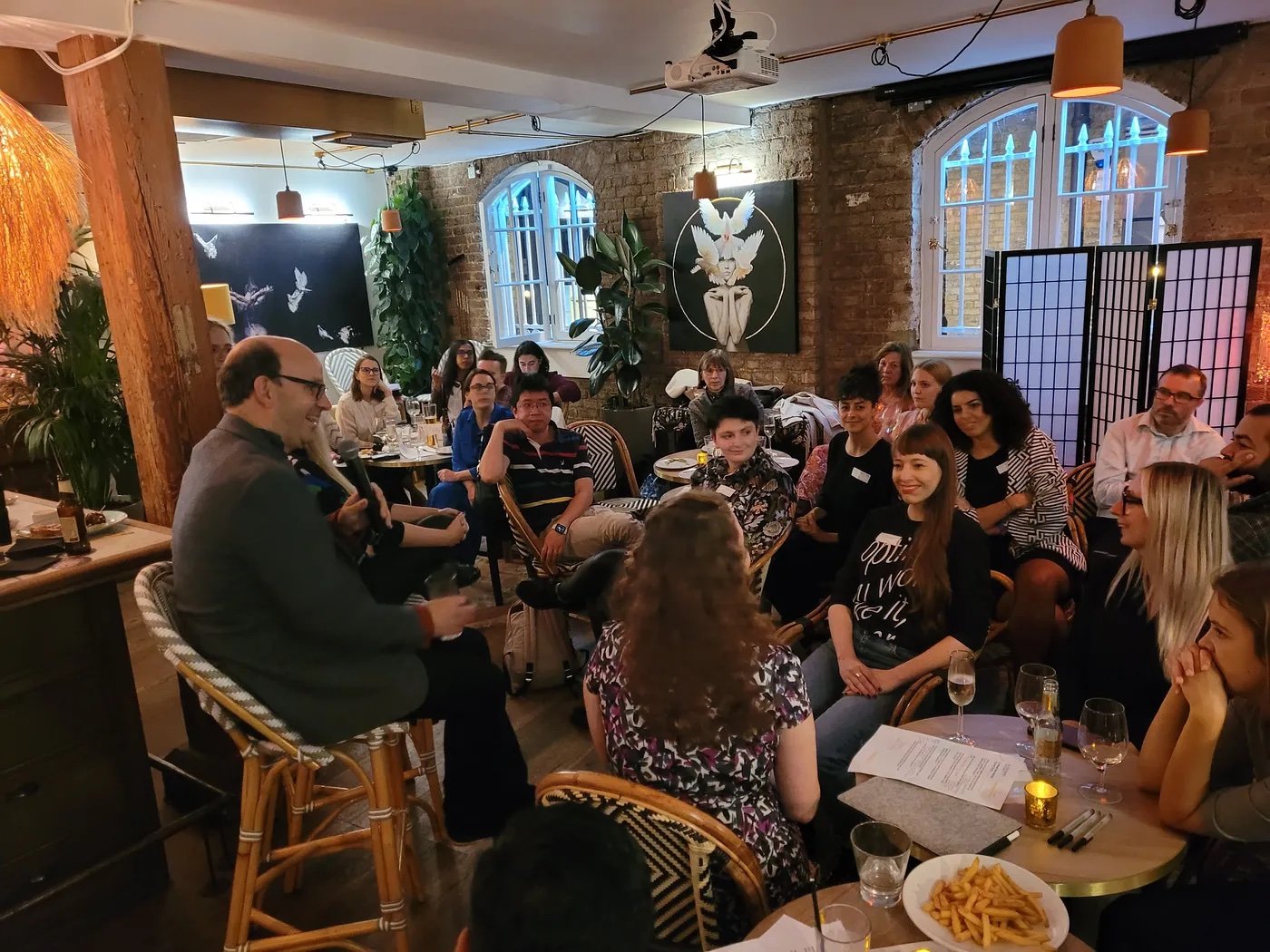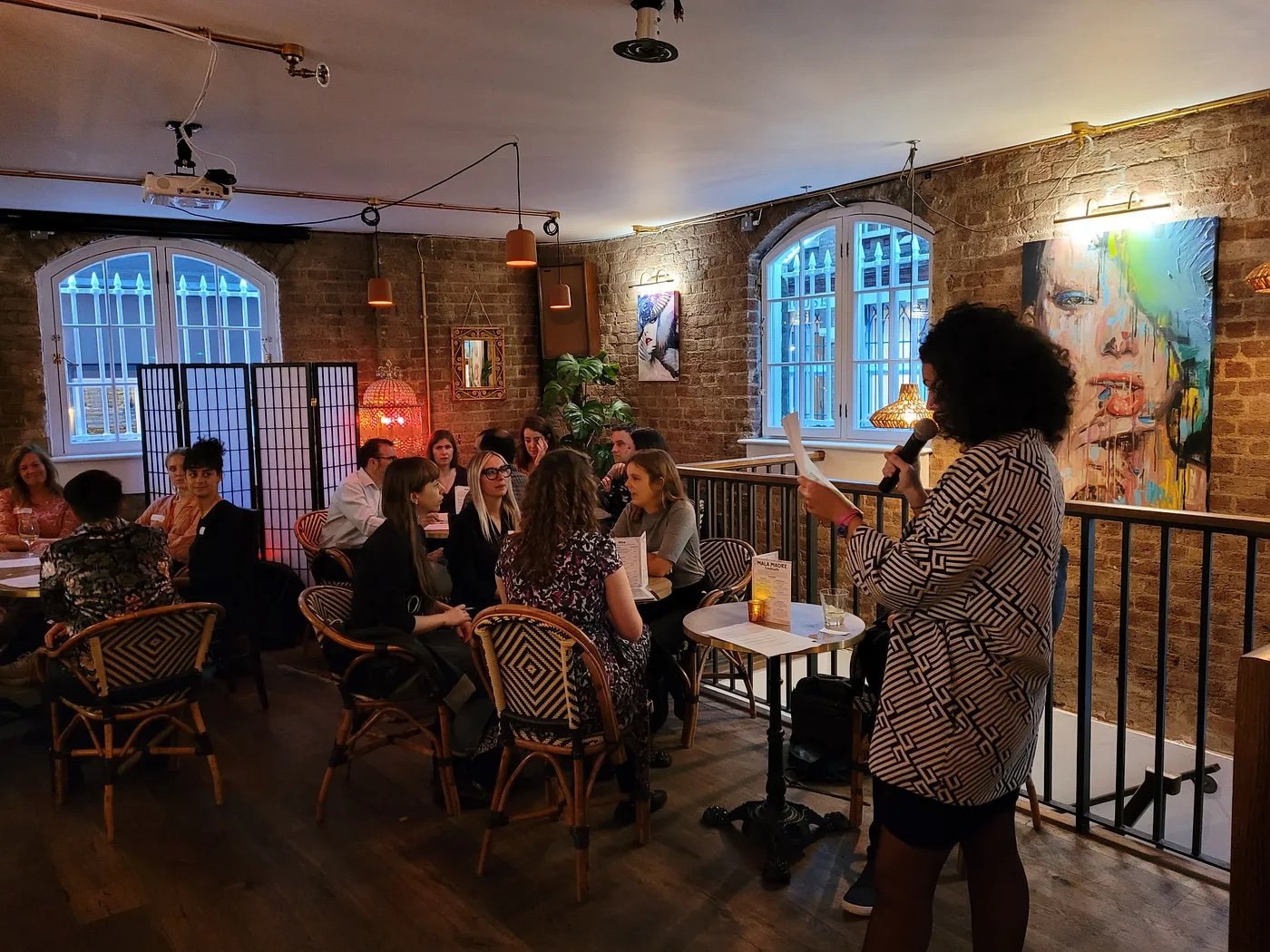What could the future of grantmaking look like?
An insight into “Modern Grantmaking: A Guide for Funders Who Believe Better is Possible”

Last week, I.G. hosted the second #IGBookClub of the year at The Last Talisman, and welcomed friends, colleagues and sector leaders for a lively conversation around grantmaking practices. We were also privileged to be joined by the authors of Modern Grantmaking: A Guide for Funders Who Believe Better is Possible— Gemma Bull and Tom Steinberg — who gamely answered questions and fuelled discussions on the “future” of grantmaking they are calling for in their book. Powered by great food, drinks, and the novelty of chatting away from a computer screen, the event was a great success.
Here’s some of the highlights for those who couldn’t be with us!
Modern Grantmaking acts as both a critical retrospective of traditional grantmaking and an unapologetic call to action for progressive funding practices. It implores its readers to be part of the solution, providing a personal roadmap for us all to drive change. It is filled with detailed guides and tips for funders and grantmakers across all levels of seniority, and asks readers to consider what they can do as individuals to transform grantmaking into a more equitable and progressive practice.
Attendees came ready and enthusiastic with a willingness to ask thoughtful questions and reflect on the role they can have in facilitating participatory grantmaking. Following a lightning pub quiz, the room broke off into groups to reflect not only on the content of the book but also the issues that are dominating our sector, before the much-awaited Q&A session with the authors finally began.

It felt as if the refreshingly open thinking of the book bled seamlessly into the discussion, as attendees were ready to speak candidly about what they saw as the greatest barriers to progressive grantmaking practices. Some spoke to the technical, arguing that the level of red-tape and bureaucracy that surrounds larger foundations will often stop grantees from progressing before they’ve even really begun. Others spoke to the cultural and systemic barriers to entry, including the pervasive power of privilege in grantmaking and the difficulties in recognising one’s own privilege in the first place.
But no subject was quite as consistently highlighted as the elusiveness of securing unrestricted funding. Modern Grantmaking is clear in its emphasis on the modern grantmaker’s giving of unrestricted funding, and the need for reform was echoed by our attendees. What became clear from the discussion was that the need for structural changes is evident across all parts of the grantmaking process — from grantee confusion about how to receive unrestricted funds to the difficulty that grantmakers face to persuade trustees of the valuable risk of giving those funds.
We at I.G. left the event simply feeling invigorated about the role we can play in facilitating a grantmaking landscape that is fair, equitable and reflective of the progress for which it is striving. The future of grantmaking is yet to be decided but one thing is for sure: we are not alone in thinking it is possible for positive changes to be made — and it’s on all of us to make this happen.
Institutions don’t drive change. People do. People are the idea generators, project implementers, and system shakers. Yet, while we often talk about the importance of investing in organisations, we rarely think about investing in the people who lead them.
Since March 2022, I.G. Advisors has worked closely with Kurt Geiger to design and implement Business by Design—a fully-funded, AQA-accredited programme co-created with young people to drive access, opportunity, and equity in the creative industries. This isn’t a side initiative—it’s embedded in how the business operates.
As we close the chapter on 2024 and step into a new year, our Advisor, Harriette, finds herself reflecting on what’s needed to move philanthropy forward in 2025.
It’s not a groundbreaking revelation that staff wellbeing and burnout are huge challenges our sector is facing right now, and the sector-wide lack of investment in professional development has a lot to answer for.
Our Associate Advisor Charly makes the case that greater investment in your grantmaking team = greater impact for your organisation, and beyond.
While philanthropy and football may seem worlds apart, I’ve started thinking about the many similarities that can provide valuable lessons for those in the philanthropic sector. I for one, am always learning about the essential elements of football that can inspire and inform effective philanthropy.
Through the power of collective design, our fundraiser and grantmaker #FixTheFlow Fellows have imagined the future of our philanthropic funding system, and we should all listen carefully.
In the coming months, our Associate Carli is exploring the complexities of social innovation and will share her learnings, insights, and questions with you.
I.G.’s CEO Emily shares some of the mistakes and challenges she found during her leadership journey, and what she learned and will share in I.G.’s new Leadership Lab.
I’m expected to show up as a leader, but don’t feel like a leader. Introducing Impact & Grow: A Leadership Lab.
Leveraging Limited Funds For Humanitarians: Insights from the 2024 #HX24 conference, organised by Save the Children UK and the Humanitarian Leadership Academy.
Social enterprises have a particularly interesting relationship with Monitoring, Evaluation and Learning (MEL) as they need to capture both the financial and social/ environmental impact of their work, and speak to a wide range of potential funders and investors. Caitlin McLoughlin chatted to Abhinav Khanal, Co-Founder and Executive Director of Bean Voyage, to explore this further.
Image Credit: Bean Voyage
A round up of everything the I.G. team did in 2023!
Introducing a new, dedicated funders stream to I.G.’s #FixTheFlow Fellowship! We’re accepting applications until 17th November (for a 2024 start). Join our movement at fixtheflow.org
Join us for one (or all!) our eight workshops in our Autumn Training Series, where we will cover some of the trickiest topics facing fundraisers today.
What does meaningful and effective learning actually mean in practice?
Our Advisor Caitlin interviews Kore Global’s Emily Boost on learning how to learn and all things feminist evaluation and learning.
How do we balance our passion and our desire to give our best, whilst not being consumed by failure to live up to our own or others’ expectations?
At I.G. Advisors (I.G.), we’re often approached to design and implement evaluations for our clients to understand the impact of their grantmaking, fundraising or programmatic strategies, and identify opportunities for evolution.
The ‘lone saviour’ approach won’t cut it (and it also might destroy you).
It’s hard to believe it now that we’re living through a polycrisis, but the financial crisis and Great Recession of the 00s felt like a once-in-a-lifetime jolt to the world order at the time.
What you can learn from others leading philanthropic networks like yours
‘Well, we could have called that one.’
I.G. Advisors (I.G.) recently had the pleasure of collaborating with The Big Give and Rosa on the Women and Girls Match Fund.
Being a parent is often a thankless task. You take something and nurture it, treating it with love and care, losing sleep and worrying if — against all odds — , it will achieve its full potential and become the best it can be. It may never, ever show gratitude for your sacrifice. And then one day it will grow up and leave.
New I.G. Insights report explores how fundraisers and funders can support digital fundraising for racial justice issues.
#TaxPhilanthropy — wealth holders have the power to pay more tax right now even if governments fail to reform their policies
How starting small might be the most effective way to change the world.






























